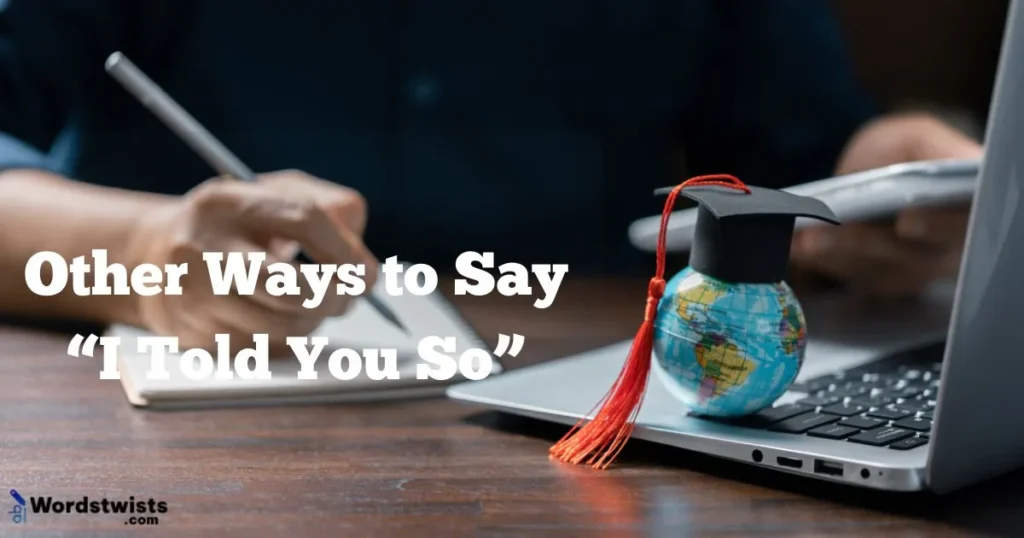We’ve all been there—watching someone ignore a friendly warning or advice, only to see things go exactly as predicted. The classic phrase “I told you so” comes to mind. But let’s be honest, saying it that way too often can sound a little harsh or even annoying. Sometimes, you want to express your point with more finesse, humor, or kindness. That’s why having a variety of other ways to say “I told you so” is a real game-changer.
Using fresh and creative alternatives lets you communicate your insight or advice with personality and tact. It makes your conversations more engaging and less confrontational, whether you’re chatting with friends, family, or colleagues. Plus, it sharpens your communication skills by helping you express your thoughts clearly and confidently.
In this post, you’ll find 25 compelling alternatives to “I told you so” that range from playful to polite, all with helpful explanations and practical examples. Ready to sound smarter, kinder, and more convincing? Let’s dive in!
Alternatives to “I Told You So”
1. Didn’t I say?
Explanation:
This short and casual phrase is a less aggressive way to remind someone you gave them a heads-up earlier. It works well when you’re being playful, not bossy.
Examples:
- Didn’t I say that would happen?
- Didn’t I say the weather would turn bad?
- Didn’t I say you’d love that movie?
- Didn’t I say the traffic would be aggravating today?
- Didn’t I say we should leave earlier?
Why it works:
It’s light, a little cheeky, and keeps the mood friendly while still making your point. It shows confidence without sounding like you’re rubbing it in.
2. See?
Explanation:
“See?” is a one-word comeback that’s quick, confident, and widely used. It’s simple but powerful, especially in casual conversations.
Examples:
- See? I told you she’d show up late.
- See? That’s why I brought snacks.
- See? I knew the app would crash.
- See? He’s already calling you back.
- See? It was worth waiting!
Why it works:
It’s brief and feels natural. You’re not bragging—you’re just confirming what you said earlier with a friendly nudge.
3. That’s what I was saying.
Explanation:
This phrase shows that your earlier opinion or suggestion matched the outcome. It’s calm and non-judgmental.
Examples:
- That’s what I was saying—he’s not ready for this.
- That’s what I was saying about the deadline.
- That’s what I was saying when I suggested a backup plan.
- That’s what I was saying all along!
- That’s what I was saying, but no one listened.
Why it works:
It reinforces your point of view in a polite and self-assured tone—especially helpful in group settings.
4. Just as I predicted.
Explanation:
This version adds a touch of cleverness or insight, often used when you’ve made a spot-on prediction.
Examples:
- Just as I predicted, they sold out.
- Just as I predicted, the client wanted changes.
- Just as I predicted, the plan backfired.
- Just as I predicted, we finished early.
- Just as I predicted, she loved the gift.
Why it works:
It makes you sound smart and observant—especially useful in professional or thoughtful discussions.
5. I called it.
Explanation:
This casual phrase shows confidence and foresight. It’s great for friendly situations, especially when you’re feeling a little smug—but in a good way.
Examples:
- I called it—he forgot his keys again!
- I called it—another late train.
- I called it—you aced the test.
- I called it—pizza night wins again.
- I called it—he wouldn’t show.
Why it works:
It sounds cool, current, and in-the-know. Perfect when you want to show you were ahead of the curve without being rude.
6. I saw that coming.
Explanation:
Use this to point out that the outcome didn’t surprise you. It sounds casual and honest, not braggy.
Examples:
- I saw that coming a mile away.
- I saw that coming—too many cooks in the kitchen.
- I saw that coming—he always gets emotional.
- I saw that coming—wrong day to wear white!
- I saw that coming—she’s predictable.
Why it works:
It keeps things relatable and real. You’re not showing off—just stating the obvious with confidence.
7. What did I tell you?
Explanation:
This rhetorical question brings humor and confidence. It’s often said with a smile and light tone.
Examples:
- What did I tell you? That shortcut was faster.
- What did I tell you about that guy?
- What did I tell you? She crushed the performance.
- What did I tell you? Always check the weather.
- What did I tell you? I said we’d win.
Why it works:
It creates a friendly reminder that you were right—without shaming anyone. It keeps the vibe casual and conversational.
8. Exactly as I thought.
Explanation:
This is a confident and polite way to acknowledge that your assumption or advice turned out correct.
Examples:
- Exactly as I thought, they canceled the show.
- Exactly as I thought, it was a trap.
- Exactly as I thought, she was hiding something.
- Exactly as I thought, he forgot again.
- Exactly as I thought, the test wasn’t that hard.
Why it works:
It sounds measured and reflective, great for both personal chats and professional feedback moments.
9. I had a feeling this would happen.
Explanation:
This phrase expresses your foresight without being direct or confrontational. It softens the tone.
Examples:
- I had a feeling this would happen.
- I had a feeling we’d need more snacks.
- I had a feeling they’d be late.
- I had a feeling the price would drop.
- I had a feeling something wasn’t right.
Why it works:
It’s empathetic and gentle—showing emotional intelligence while still expressing that you were right.
10. That’s why I warned you.
Explanation:
Use this when you gave someone a clear heads-up, and your advice was ignored. It’s straightforward but still thoughtful.
Examples:
- That’s why I warned you about rushing.
- That’s why I warned you not to trust him.
- That’s why I warned you to double-check.
- That’s why I warned you it might be risky.
- That’s why I warned you about skipping the tutorial.
Why it works:
It reminds the other person of your earlier guidance and that you had their best interest at heart.
11. I knew it all along.
Explanation:
This phrase shows quiet confidence. It’s great when you had a strong belief from the start and want to reflect on it with calm assurance.
Examples:
- I knew it all along—he was hiding something.
- I knew it all along you’d get the promotion.
- I knew it all along the plan wouldn’t work.
- I knew it all along she’d love the surprise.
- I knew it all along you’d come through.
Why it works:
It sounds thoughtful and confident, not cocky. You’re just reflecting on how clear the outcome was from the beginning.
12. Told you that would happen.
Explanation:
This phrase is short and direct. It works best when used with a light, joking tone to keep things friendly.
Examples:
- Told you that would happen if you skipped breakfast.
- Told you that would happen when you waited till the last minute.
- Told you that would happen if we didn’t double-check.
- Told you that would happen—too many open tabs!
- Told you that would happen with that shortcut.
Why it works:
It gets to the point without being harsh, especially if you say it with humor and warmth.
13. Looks like I was right.
Explanation:
This phrase is slightly more modest. It suggests that your earlier guess or advice turned out correct—without bragging.
Examples:
- Looks like I was right about the rain.
- Looks like I was right about the schedule.
- Looks like I was right—she didn’t show.
- Looks like I was right to bring extra snacks.
- Looks like I was right about the update.
Why it works:
It’s neutral and non-confrontational, letting the result speak for itself while acknowledging your accuracy.
14. It’s just like I said.
Explanation:
This phrase links the current outcome with your earlier suggestion, gently reinforcing your original point.
Examples:
- It’s just like I said—the app isn’t reliable.
- It’s just like I said, he changed his mind.
- It’s just like I said—the show was amazing.
- It’s just like I said—bring a jacket.
- It’s just like I said, she needed more time.
Why it works:
It sounds familiar and friendly, great for showing your consistency without sounding superior.
15. You should have listened.
Explanation:
This one is a bit more direct. It’s best used when you’re close to the person and can speak honestly without offense.
Examples:
- You should have listened when I warned you.
- You should have listened about the late fees.
- You should have listened when I said it was risky.
- You should have listened to your gut.
- You should have listened to the instructions.
Why it works:
It emphasizes the value of advice—but be careful. Use it with care or humor to avoid sounding harsh.
Read more: Other Ways to Say “By the Way”
16. I warned you about this.
Explanation:
This phrase highlights that you gave someone fair warning. It’s calm and factual, not gloating.
Examples:
- I warned you about this route.
- I warned you about rushing.
- I warned you about the system being buggy.
- I warned you about mixing those colors!
- I warned you about ignoring the signs.
Why it works:
It brings the focus back to helpful guidance, which makes you look wise rather than arrogant.
17. That’s why I said so.
Explanation:
This phrase shows that your suggestion or advice was based on good reasoning—even if it wasn’t followed.
Examples:
- That’s why I said so about the early flight.
- That’s why I said so in the meeting.
- That’s why I said so when I advised caution.
- That’s why I said so—we needed more time.
- That’s why I said so about budgeting.
Why it works:
It reflects logic and reasoning. You’re not just saying “I was right,” but explaining why you said what you did.
18. It turned out just as I said.
Explanation:
This phrase shows your earlier statement matched reality. It sounds thoughtful and reflective.
Examples:
- It turned out just as I said—they ran out of stock.
- It turned out just as I said—the deadline was moved.
- It turned out just as I said—rain ruined the picnic.
- It turned out just as I said—they needed help.
- It turned out just as I said—traffic was horrible.
Why it works:
It sounds measured and observant, especially helpful in serious or reflective moments.
19. I saw it coming from a mile away.
Explanation:
A vivid way to express your foresight. This one works well when the outcome was obvious to you.
Examples:
- I saw it coming from a mile away—too many red flags.
- I saw it coming from a mile away—he always does that.
- I saw it coming from a mile away—that app was a scam.
- I saw it coming from a mile away—they’d cancel.
- I saw it coming from a mile away—the food wouldn’t be ready.
Why it works:
It’s visual and expressive, showing how clear the situation was to you in hindsight.
20. You can’t say I didn’t warn you.
Explanation:
This phrase is direct but often used with humor or playful frustration. It reminds the listener you gave them a fair chance.
Examples:
- You can’t say I didn’t warn you about that dish!
- You can’t say I didn’t warn you about the weather.
- You can’t say I didn’t warn you about the delay.
- You can’t say I didn’t warn you—remember our chat?
- You can’t say I didn’t warn you about the price hike.
Why it works:
It places gentle responsibility on the other person—without being too critical.
21. I expected this result.
Explanation:
This is a composed, slightly formal way to say that you weren’t surprised by what happened.
Examples:
- I expected this result after the last report.
- I expected this result from how things were going.
- I expected this result, honestly.
- I expected this result with that timeline.
- I expected this result based on their behavior.
Why it works:
It’s neutral and analytical, making it suitable for professional or serious settings.
22. I told you it wouldn’t work out otherwise.
Explanation:
This one emphasizes that your earlier advice was conditional—and now the outcome proves your point.
Examples:
- I told you it wouldn’t work out otherwise without prep.
- I told you it wouldn’t work out otherwise if we skipped testing.
- I told you it wouldn’t work out otherwise without a backup.
- I told you it wouldn’t work out otherwise if we didn’t plan.
- I told you it wouldn’t work out otherwise with that supplier.
Why it works:
It brings logic to your statement—showing cause and effect, not just “being right.”
23. I was on to something.
Explanation:
This is a humble, self-aware way to show that your thoughts had value—even if they weren’t fully accepted at the time.
Examples:
- I was on to something with that idea.
- I was on to something when I questioned that decision.
- I was on to something about the delay.
- I was on to something—glad I trusted my gut.
- I was on to something with my guess.
Why it works:
It’s subtle and confident, showing you were thinking ahead without sounding like a know-it-all.
24. What did I say?
Explanation:
This is a friendly, confident way to bring attention to your earlier insight—best used playfully.
Examples:
- What did I say? I knew it!
- What did I say about that shortcut?
- What did I say? Don’t trust the weather app!
- What did I say? She always wins.
- What did I say? He forgot—again!
Why it works:
It sounds relatable and relaxed, perfect among friends or when keeping the tone fun.
25. The signs were there.
Explanation:
Use this when the outcome seemed obvious based on previous clues. It’s a calm, reflective statement.
Examples:
- The signs were there—we just didn’t act fast enough.
- The signs were there from the beginning.
- The signs were there—she was never committed.
- The signs were there—it was risky.
- The signs were there—they needed help.
Why it works:
It shifts the focus from “I was right” to a shared awareness, keeping things gentle and inclusive.
Conclusion
Saying “I told you so” doesn’t have to be cold or annoying. With these 25 smart and expressive alternatives, you can share your insight, validate your instincts, or offer a gentle reminder—with style, tact, and emotional intelligence.
These phrases help you communicate clearly, show confidence, and connect better with others—whether you’re writing an email, chatting with friends, or offering advice in a meeting.

I’m Leo Knox, the wordplay wizard behind WordsTwists.com where I turn everyday meanings into funny, clever, and creative twists. If you’re tired of saying things the boring way, I’ve got a better (and funnier) one for you!


